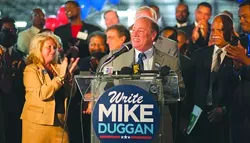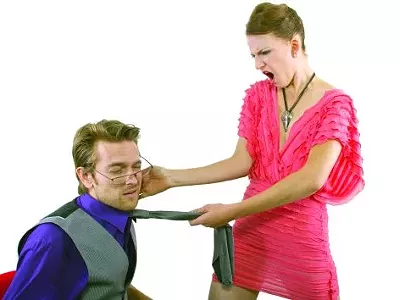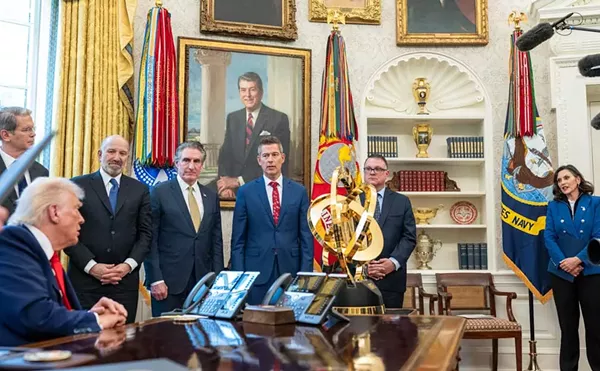
Audio By Carbonatix
[
{
"name": "GPT - Leaderboard - Inline - Content",
"component": "35519556",
"insertPoint": "5th",
"startingPoint": "3",
"requiredCountToDisplay": "3",
"maxInsertions": 100,
"adList": [
{
"adPreset": "LeaderboardInline"
}
]
}
]

Years ago, I read an account of a farmer whose entire homestead had been destroyed by a cyclone. When rescuers arrived, they found him sitting in the ruins — laughing.
“What’s so funny?” he was asked. “The completeness of it,” the farmer said.
Benny Napoleon was not, by all accounts, laughing last week — nor should he have been.
Mike Duggan swamped him in a primary race where Napoleon was on the ballot and anyone who wanted to vote for Duggan had to write his name in. Polls had shown, in fact, that Duggan did have a good chance of making the runoff.
Yet, nobody expected anything like this. Napoleon — Wayne County sheriff, former Detroit police chief and a well-liked figure in the city for more than a decade — got 28,532 votes for mayor.
But Mike Duggan, a cheerful carpetbagger who moved into Detroit a year ago last April to run for mayor, got 44,395 people to not only write in his name, but spell it perfectly!
That was the vast majority of all the supposedly illiterate Detroiters who cast write-in votes. (In fact, almost 53 percent of all the votes were write-ins, even with 14 names on the ballot.)
What about the barber, Mike Dugeon, who appeared on the scene days before the election, and was taken to file as a write-in candidate by journalist-provocateur Charlie LeDuff?
He got a grand total of 17 votes, plus, according to my reading of the absentee ballot list, maybe 20 more people who meant to vote for him but misspelled his name.
There were thousands of other misspellings from voters who clearly meant to vote for the real Duggan, including folks who wrote in “The White Guy Mike Duggan,” and “Mike Duggan the Whiteman.” Duggan even got a dozen votes for city clerk.
Nobody has ever seen anything like this; the vote was not only huge, it was pretty universal. Duggan, according to the Free Press, carried 574 out of 611 precincts. Tom Barrow, now mostly a bad joke, carried one where only four people voted.
Napoleon got the rest, with the exception of one where nobody showed up to vote. Once the impact of all this had sunk in, the pundits and talking heads immediately started saying this didn’t mean Duggan would win in November.
True, he had done better than anyone expected, but they said this didn’t really mean all that much, since the turnout was very small — 18 percent of the registered voters. In three months, they said, the electorate would be entirely different.
I think that view is entirely wrong.
Yes, Duggan could make some horrible mistake, such as coming out in favor of imposing Sharia law. Or, we could learn that he has three women tied up in a house somewhere.
But neither of those possibilities is very likely. Essentially, this election is probably over. There are a number of myths at work here. One is that the turnout was tiny.
In fact, it wasn’t all that small. One of the biggest pieces of fiction in politics is that there are 550,000 registered voters in Detroit. Those include names that long ago died, moved away or were traded for a player to be named later.
The U.S. Census Bureau last year estimated there are only 514,000 adults living in Detroit. Many of those are not registered. My guess is that the total of “real” registered voters is less than 400,000 — given that, and last fall’s election results.
Nobody has ever excited African-American voters as much as President Barack Obama. In November 2012, for the first time in history, there was a higher percentage turnout of black than white voters in a national presidential election.
Here is what the vote was in Detroit: Obama 281,338, Mitt Romney 6,016. Fewer than 300,000 voted in last year’s presidential election, when interest was at a record high.
Four years ago, in the November 2009 election for mayor, fewer than 125,000 Detroiters voted — and everyone agrees the population has shrunk since then. Here, according to unofficial results, are the total votes cast in last week’s primary: 95,691.
Is it rational to think — as some seemed to hint — that vast legions of black voters are going to materialize and march to the polls to prevent “them” from “taking back Detroit?”
Hardly — most of Duggan’s voters this time were African-American as well. There are few white voters left in Detroit.
There may, indeed, be some racial mutterings in the fall campaign. But the primary results demonstrated a number of other things too. They showed that Detroiters are, by and large, sick of the identity politics game. Krystal Crittendon, the obstructionist former corporation counsel, got 5.5 percent.
Everybody else got far less. This election did definitively settle one thing: Detroiters do not want Tom Barrow to be mayor, now or ever. He previously lost races in 1985 and 1989.
Then, after doing time, he lost in 2009. This time, after filing lawsuit after lawsuit, he wound up with less than 4 percent of the vote. What part of no doesn’t he understand?
The election returns showed that Detroiters want someone who they feel can make the city work and they have settled on Duggan, the longtime Wayne County political fixer, and the man who they believe turned the Detroit Medical Center around. He, the voters seem to have concluded, has the best chance of doing that.
For all practical purposes, this election seems to have been decided. If Benny Napoleon is to prove me wrong, he needs to very quickly articulate a vision for the city that goes beyond fighting crime. He speaks very coherently on that subject, but not on much else. During the debates I saw, Napoleon mostly looked like he’d rather be anywhere else.
He needs to tell voters what he would do to keep this city solvent and make it prosperous when bankruptcy is over and the emergency manager leaves, presumably in October 2014.
There’s a challenge for Mike Duggan too. He is clearly the establishment candidate; business interests and their political action committees have poured money into his campaign.
They will pour more into it this fall. They want him sitting at Emergency Manager Kevyn Orr’s right hand, watching what he is doing and getting ready to take over.
But then what? How would Mike Duggan “fix” Detroit?
The emergency manager and the bankruptcy court only have to get rid of the bad debt and balance the books — and then they are gone.
How does Mike Duggan propose to make this city work again after that? How will he get cops on the streets and work with the Detroit Public Schools to make those proposals realistic options? What would he do to bring jobs here; not just recycled jobs from the suburbs?
The voters need to know these things and members of the news media need to push both candidates for answers.
Incidentally, this primary election — and everything surrounding it — was anything but journalism’s finest hour. There was far too much attention given to the antics of Tom Barrow and Mike the Barber. Most outlets committed the mystifying error of treating Robert Davis as credible; this is a guy currently awaiting trial in federal court for embezzling from Highland Park Schools.
Detroiters went to the polls in greater numbers than expected last week and the majority of them cast what looks like a sane and responsible vote for the city’s future.
For that, they deserve a fair amount of respect.
Jack Lessenberry opines weekly for Metro Times. Send comments to letters@metrotimes.com.





